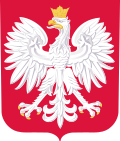29 November 1987 | |
 Ballot paper for the referendum | |
| Outcome | The referendum result was not binding, as the required majority of over 50% of all eligible voters voting "yes" to each question was not achieved |
|---|---|
| 1. Are you for full implementation of the program of radical curing of the economy presented to the Sejm aimed at clear improvement of the society’s living conditions, knowing that it will require going through a two-to-three-year period of quick changes? | |
| 2. Are you for the Polish model of deep democratization of political life, the goal of which is to strengthen self-management, expand rights of citizens and increase their participation in governing the country? | |
 |
|---|
A referendum on political and economic reforms was held in Poland on 29 November 1987. [1] The government's aim in holding the referendum was to obtain a mandate for difficult economic and political reforms. Around a third of eligible voters did not participate, defying the regime. [2] Only 44% of Poland's 26 million eligible voters voted yes to the question on economic reform, and 46% voted yes to the second question on "democratisation" in Poland. Even though a majority of the votes cast supported the propositions, according to the rules of the referendum the majority of eligible voters had to vote yes in order for the referendum to pass. The resulting failure of the referendum was unprecedented, as it was the first time that Communist authorities in Eastern Europe had lost a vote. [2]